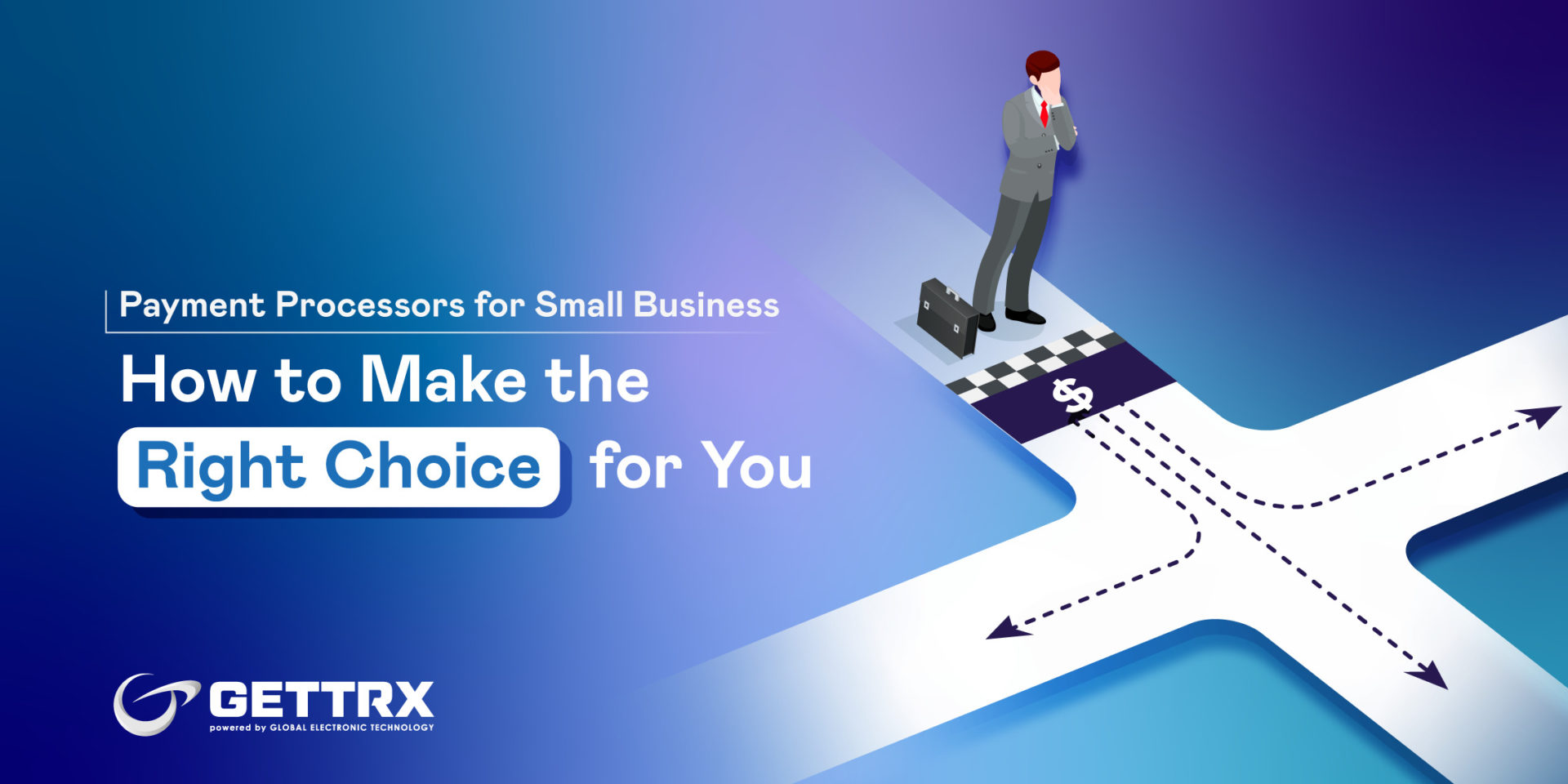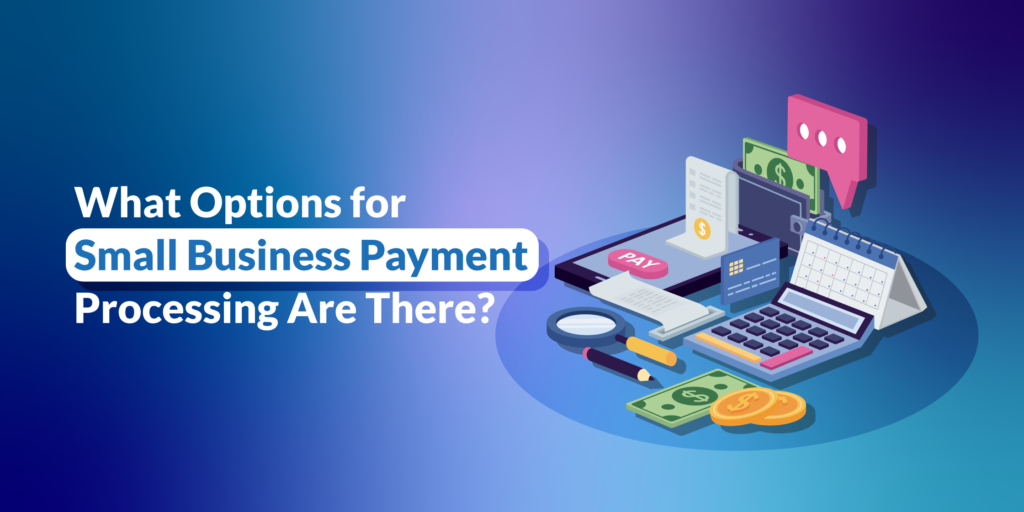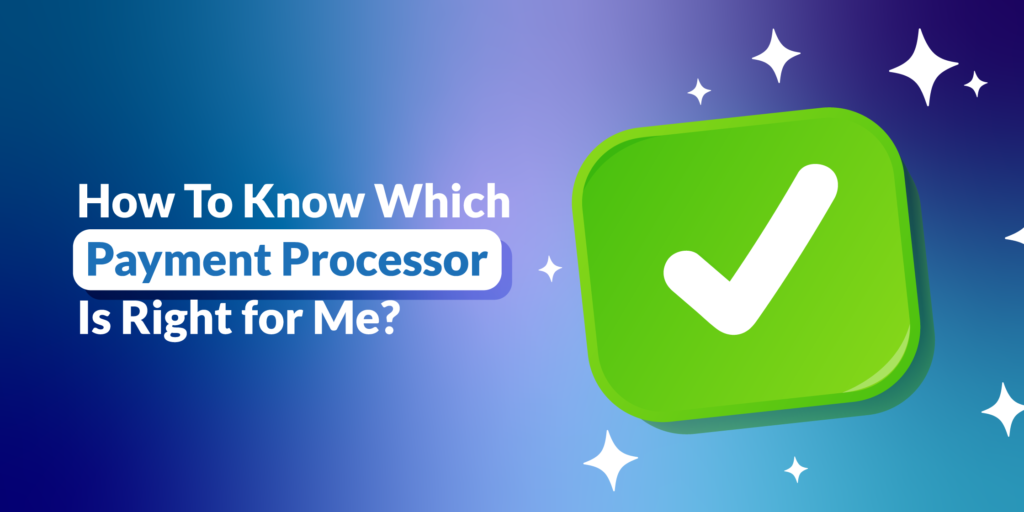Tired of sifting through countless payment processor options for your small business? We know the feeling. With so many options available, it can be challenging to determine which one is the best fit for your business needs.
So, how do you choose the right one?
You want to ensure you’re not overspending on fees while offering your customers a seamless payment experience.
This article aims to provide you with the tools and knowledge to make the right choice for your small business. We’ll take a deep dive into payment processing and explore the various options available, including debit card, credit card, ACH, digital wallet, and payment gateway processing.
We’ll also provide you with six essential questions to ask when evaluating payment processors so that you can make an informed decision.
And for those new to payment processing, we’ll also cover the basics to ensure you have a solid understanding.
Get ready to gain some clarity and take the first steps toward payment processing success.
Related Article: Top 9 Challenges in Online Payments and How to Overcome Them
Table of Contents
Key Takeaways
- Payment processing is the transfer of funds from a customer to a merchant’s account, involving various entities such as the consumer, the merchant, the acquiring bank, the credit card network, the card issuer, and the payment processor.
- Small businesses have several payment processing options, including debit card payment processing, credit card payment processing, ACH payment processing, digital wallet payment processing, and payment gateway.
- When determining the right payment processor for your business, consider factors such as business size and type, payment options, fees and pricing, security, customer support, and integration.
- Payment processors make money by charging merchants a fee for each transaction, typically including a percentage of the transaction amount plus a flat rate per transaction.
- Setting up a payment processor for your small business involves choosing a processor that suits your business needs and budget, completing the application process, and setting up a merchant account.
What Is Payment Processing, and Who Is Involved?
When you buy something from a business, you typically have the option to pay for it electronically using a credit or debit card, or with another digital solution (e.g. Apple Pay, Google Pay).
The process of transferring funds from the consumer’s account to the merchant’s account is known as payment processing.
Several parties are involved in payment processing, each with their unique role.
Here’s a breakdown of who’s involved:
The Consumer
The consumer is the person making the payment. They provide their payment information, such as their credit card number, to the merchant to process the payment. The consumer’s payment information is encrypted to ensure it remains secure during the payment process.
The Merchant
The merchant is the business or organization that is receiving the payment. They are responsible for processing the payment, ensuring that the payment information provided is accurate and valid, and that the payment is completed securely.
The Acquiring Bank
The acquiring bank is the financial institution that processes the payment on behalf of the merchant. They act as an intermediary between the merchant and the credit card network.
The Credit Card Network
The credit card network is the system that processes credit card payments. Examples of credit card networks include Visa, Mastercard, and American Express. When a payment is processed, the credit card network verifies the payment information and sends the payment to the card issuer.
The Card Issuer
The card issuer is the financial institution that issued the credit or debit card used to make the payment. They are responsible for verifying the payment information provided by the consumer and approving or declining the payment.
The Payment Processor
The payment processor is the company that facilitates the payment process by connecting the merchant, the acquiring bank, the credit card network, and the card issuer. They ensure that the payment is securely processed and that all parties involved receive the appropriate funds. Payment processors may also offer additional services, like fraud detection and prevention, chargeback management, and reporting and analytics.
Related Post: Importance of Payment Processing
What Options for Small Business Payment Processing Are There?
Small business owners have a range of payment processing options available to them. Each of these options has its unique features, benefits, and drawbacks.
The options are as follows:
1. Debit Card Payment Processing
Debit card payment processing allows small businesses to accept payments via a customer’s debit card. These transactions are processed in real-time and are relatively low-cost. Debit card payment processing is a great option for small businesses that deal with a high volume of low-value transactions.
2. Credit Card Payment Processing
Credit card payment processing is similar to debit card payment processing, allowing small businesses to accept payments via a customer’s credit card. Credit card processing is generally more expensive than debit card processing, but it is an essential option for small businesses that want to offer their customers more payment flexibility.
3. ACH Payment Processing
ACH payment processing allows small businesses to receive payments via electronic bank transfers. This option is popular for recurring payments, such as subscription services, and is also a great option for businesses that need to process large transactions.
4. Digital Wallet Payment Processing
Digital wallet payment processing is a newer option that has become increasingly popular recently. It allows customers to make payments via their mobile devices, such as Apple Pay, Google Wallet, or PayPal. Digital wallet payment processing is a secure and convenient option for small businesses that want to offer their customers a seamless payment experience.
5. Payment Gateway
A payment gateway is a software application that connects a merchant’s website to a payment processor. Payment gateways allow small businesses to accept payments online securely. This option is ideal for small businesses selling their products or services online.
6 Questions to Ask When Determining the Right Processor for Your Business
Choosing the right payment processor for your small business can be a daunting task. With so many options available, asking the right questions is essential to making an informed decision.
Here are six questions you should ask when determining the right processor for your business.
1. Can I accept a wide variety of payment options?
When choosing a payment processor, consider the types of payments your business accepts. Look for a processor that allows you to accept a wide range of payment options, including credit and debit cards, ACH, digital wallets, and more. The more payment options you can accept, the easier it will be for your customers to pay, which can lead to increased sales and customer loyalty.
2. What are the fees and pricing structures like?
Fees and pricing structures can vary widely between payment processors. Look for a processor that offers transparent and competitive pricing. Make sure to consider all fees, including transaction, monthly, and chargeback fees. Understanding the pricing structure is essential to ensure that you are not overpaying for payment processing services.
3. Is there contractual flexibility as my business changes?
Your payment processing needs may also change as your business grows and changes. Look for a payment processor that offers flexible contract terms that can adapt to your changing needs. Avoid long-term contracts that lock you into a specific payment processor, as this can limit your options and increase costs.
4. Is the processing secure and safe?
Security and safety are critical considerations when choosing a payment processor. Look for a processor that offers state-of-the-art security features, such as encryption and fraud prevention tools. Additionally, ensure that the processor is compliant with industry standards, such as PCI DSS.
5. How is the customer support and uptime on the network?
Your payment processing system needs prompt and reliable customer support when something goes wrong. Look for a processor that offers 24/7 customer support, so you can get help when you need it. Additionally, consider the uptime of the payment processing network. The higher the uptime, the less likely you are to experience downtime or outages that could impact your business.
6. Is the processing system easy to use and integrated?
Finally, check out the payment processing system’s ease of use and integration. Look for a processor with user-friendly interfaces and easy integration with your existing systems. A payment processing system that is easy to use and integrate can save you time and money in the long run.
How Do I Know Which Payment Processor Is Right for Me?
Amidst the questions, choosing the right payment processor for your business also depends on your business type, the volume of transactions, your budget, and your customers’ preferences.
Reviewing these factors will help you make an informed decision:
Determine Your Business Needs
The first step in choosing the right payment processor for your business is determining your specific needs. Consider the types of payments you want to accept, such as credit cards, debit cards, e-wallets, or bank transfers.
You should also think about the currencies you want to support and the countries in which you want to do business. If you plan to do business internationally, you must find a payment processor that can handle cross-border payments and process transactions in multiple currencies.
Research Available Options
Once you understand your business needs clearly, start researching available payment processors that cater to businesses like yours.
Look for payment processors that are compatible with your industry or business type, such as eCommerce, brick-and-mortar retail, or service-based businesses.
It’s also important to consider your customers’ preferred payment methods, as some payment processors may not support all payment methods.
Evaluate Fees
When evaluating payment processors, compare the fees charged by each processor. Look for processors that offer transparent pricing with no hidden fees or surprises.
Typical fees include transaction fees, monthly fees, setup fees, and chargeback fees. Read the fine print and understand the pricing structure before signing up with a payment processor.
Check for Integrations
If you’re using an eCommerce platform, shopping cart, or point-of-sale system, find a payment processor that integrates well with those tools.
Check whether the payment processor has pre-built integrations or APIs that can be used to connect with your existing systems. This will help you streamline the payment process and reduce the risk of errors.
Consider Security Measures
Payment processing involves sensitive financial data, so security should be a top priority when choosing a payment processor.
Look for processors that offer robust security features such as data encryption, fraud detection, and chargeback protection. Some payment processors may also offer tools to help you comply with data protection regulations, such as the Payment Card Industry Data Security Standard (PCI DSS).
Look for Good Customer Support
In case you experience any issues or concerns, it’s important to choose a payment processor that offers good customer support. Look for processors with responsive customer service teams that can assist when needed.
It’s also helpful to check whether they offer online resources such as knowledge bases, tutorials, and FAQs to help you troubleshoot common issues on your own.
Assess Payment Processing Speed
The speed at which a payment processor can process transactions is important to consider, especially if your business deals with high volumes of transactions.
Be on the lookout for payment processors that offer fast transaction processing times and can handle multiple transactions simultaneously. Also, check if they have any delays in payment settlement, which can impact your cash flow.
Read Reviews and Get Recommendations
Before making your final decision, read reviews from other businesses that have used the payment processor you’re considering. Look for reviews highlighting the processor’s pros and cons and how well it meets the business’ needs.
You can also ask for recommendations from other business owners in your network, especially those in your industry. Getting input from others can help you gain valuable insight and make a more informed decision.
Ready to streamline your payment processes and take your small business to the next level? Contact us.
GETTRX offers custom guidance to help you explore your payment processing options and find the perfect fit for your unique needs. Our team of experts is ready to help you save time and money by providing free, unbiased advice tailored to your business.
With our help, you can focus on what matters – growing your business and collecting revenue.
Frequently Asked Questions (FAQs)
How do payment processors work?
Payment processors facilitate transactions between merchants and consumers. They verify payment details, check for fraud, and ensure the card issuer authorizes the payment.
Is PayPal a payment processor?
Yes, PayPal is a payment processor. It allows merchants to accept customer payments using PayPal accounts or credit/debit cards.
How do payment processors make money?
Payment processors make money by charging merchants a fee for each transaction. The fee is typically a percentage of the transaction amount plus a flat rate per transaction.
What fees do payment processors charge?
Payment processors may charge various fees, including transaction, monthly, and chargeback fees. Fees can vary widely between processors, so reading the fine print and understanding all costs is important.
What are the different types of payment processors?
There are several types of payment processors, including debit card payment processors, credit card payment processors, ACH payment processors, digital wallet payment processors, and payment gateways.
How do I set up a payment processor for my small business?
To set up a payment processor for your small business, you’ll need to choose a processor that suits your business needs and budget. You’ll then need to complete the application process, which typically involves providing information about your business and setting up a merchant account. Once your application is approved, you can start accepting payments from customers.
Final Thoughts
Keep in mind that each business is unique, and what works for one may not work for another. Take the time to evaluate your business needs and consider the factors that are most important to you. By doing so, you’ll be well on your way to finding the right payment processor for your small business.
Don’t hesitate to reach out if you have any questions or need further assistance in choosing the right payment processor for your small business.









